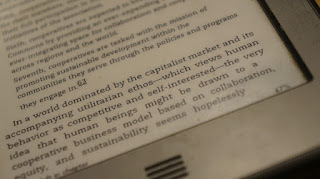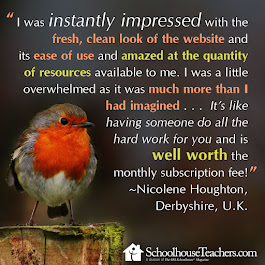This post contains affiliate links - using affiliate links from Homeschool Coffee Break helps fuel this blog and our homeschool - thank you!
Isn't technology fantastic? Most of us carry an incredibly powerful computer with us in the form of a smartphone, with access to all kinds of information. Hundreds of books and textbooks can be accessed on tablets or e-readers weighing only a few ounces. Most of us that are comfortable with using computers or tablets tend to prefer that medium, and teens and young adults usually have a very strong preference for a laptop or smaller device over writing by hand or picking up a real book. With all the power of the internet and electronic devices at our fingertips, it's probably so much more efficient and helpful to make use of it instead of choosing old-fashioned books or pencil and paper, right? Well, maybe not.
In the Writing class I'm teaching at our co-op, the textbook (The Power in Your Hands by Sharon Watson) often reminds students that they should proofread their essays from a printed page rather than on a screen. They'll catch more mistakes that way, it claims. And although I started requiring all assignments to be completed using Google Documents, I still require a hard copy to be turned in for grading. Because it's a lot easier for me to read, assess, and mark a printed page. When the students were working on their first Position Paper, they were instructed to hand-write all their research notes. I found a couple of articles that talked about how handwriting rather than typing is helpful for learning, and I keep trying to convince the kids in the class to make use of paper and pens or pencils. Sometimes it feels like a losing battle. Over the last few months I've come across other articles comparing print and screen, and the conclusions are food for thought. Perhaps not exactly what the students want to believe, but definitely worth considering.
Common sense tells us that we need to eliminate distractions when we are studying or trying to concentrate on something we are reading, writing, or learning. For some people, any background noise is distracting; and for others, some white noise, quiet music, or some other type of background noise keeps them from being driven to distraction by the silence! While learning styles and preferences vary, it's still generally true that quieter is better, and that music you listen to while studying should probably be instrumental only. But the distraction and temptation of social media and just the availability of other websites in different tabs can be a far bigger problem than most of us realize. It's a good idea to turn off all social media notifications, or perhaps put your phone or other device completely out of earshot and reach while you are focusing on your studies. If you're using the internet for homework, strive to have only the website you need open in your browser.
But as long as we stick to just the reading, surely young people can read faster and learn better when using a screen, since that's what they prefer. Right? Again, the answer is often No. Yes, many schools and colleges are providing digital textbooks, and students do want e-textbooks. Certainly e-textbooks are more portable and make life easier for students in many ways. After all, you can usually download an e-book or e-text immediately rather than wait for it to arrive in the mail, and if you own it digitally you don't need to worry as much about losing or damaging it. Students believe they perform better on comprehension and other reading tasks when reading from an e-text, but they really don't. A Business Insider article from October 2017 described some of the findings from researchers for a couple of different comprehension tests. When a text was more than a page in length, students who read it from print comprehended better than those who read it in a digital format. That may be related to a disruptive effect when scrolling.
In these studies, students read information in either print or digital form, and then were asked questions about what they read. Digital was the overwhelming preference of the students, and they thought they comprehended better reading that way. Turns out there wasn't much difference between the two mediums for general questions like identifying a main idea. But for specific details, comprehension was much better for those that read print. One advantage of digital reading was that students definitely read faster, but then again, that might not be a good thing if details are being missed. Perhaps the purpose of the reading should influence the choice of media. If you're just reading for a general overview of information, digital is probably fine, but if you're researching for a paper or studying for a history exam, you've got a better chance at retaining details if you read it in print.
Laptops and tablets are so handy to take along, and typing is so much faster than writing by hand, so obviously students assume that typing notes during class or lectures is the best way to go. Despite the prevalence of laptops being used in schools and colleges, this practice of typing notes during lectures may not be the most efficient for learning either. Because you can't write as fast you type, you have to process the information you're hearing and be more selective about what you write down. You choose keywords that will later help you recall the rest of the information. You can type out a lecture almost word for word, but research indicates that you don't analyze the information as well when doing so. In one study, students listened to TED Talks and were asked questions about them later. For simple questions like a date, students who typed and students who wrote notes did equally well. But when asked questions that required them to analyze information from the lecture, the students who wrote did much better. The study was repeated with the laptop users told to avoid taking notes verbatim, but they had trouble overcoming that tendency. In fact, researchers found that the more notes students took verbatim, the worse they performed when asked to recall information! In yet another study, students were allowed to review their notes between the lecture and the test. Once again, those who used the old fashioned pencil and paper method still did much better. You can find out more about these studies in the NPR article Attention, Students: Put Your Laptops Away.
Perhaps homeschooled students aren't as likely to need to take notes during lectures, but that is a skill they will need if they attend college. And it is certainly a useful skill to have. Start practicing, because being able to quickly decide what to write down is a learned skill. Well, unless the instructor says, "this will be on the test." That's a really good indicator that you should write it down! Good listening and note-taking skills have lots of useful applications. When choosing textbooks or reading novels for Literature class, try to go for the print version. When doing research, using the internet is clearly the most efficient way to access a lot of information in a short period of time. And let's be honest, it's far more practical than consulting an encyclopedia set or a trip to the library to find a pile of books. So weigh the options. If you have time to grab print books, try it. If the internet is the only option that really works, consider printing out the relevant pages, especially if it's available in pdf downloads or something similar. Try to read slowly and don't consider it a race. And take notes by hand rather than by copying and pasting into your own document!
Are you surprised that the printed or handwritten pages were better for students? What do you and your students prefer? Leave a comment and let me know!
Update: It's the craziest thing . . . I opened up my email today and looked at my newsletter from Writing with Sharon Watson, and guess what is on sale right now? Teach Your Students How to Take Notes. From now to the end of the month. Regular price is $10 but it's on sale for $7, and if you sign up for Sharon's newsletter, you should get a coupon code to us for another 30% off! Great timing, right?!
This post is part of the January 2019 Homeschool Collection on the Homeschool Review Crew blog.
Don't miss a coffee break! Subscribe to Homeschool Coffee Break by Email!
©2006-2018 Homeschool Coffee Break. All rights reserved. All text, photographs, artwork, and other content may not be reproduced or transmitted in any form without the written consent of the author. http://kympossibleblog.blogspot.com/
We are a participant in the Amazon Services LLC Associates Program, an affiliate advertising program designed to provide a means for us to earn fees by linking to Amazon.com and affiliated sites.













































4 comments:
fascinating information Kym. I know that reading a printed book is better for retention than ebooks. But the whole handwriting thing was new to me..... gives me arsenal in helping my lad combat some of his reluctance to write. You are also giving me a good reason to occasionally lecture my lad (in a teaching manner) in order to give him a good skills for later in life.
This is one of the reasons why I was so worried when my stepson's school started moving to only using the Chromebook. So many things could go wrong (it is technology) and what skills would he be losing or not learning. I always liked to write out my notes in class & then type them up. Better to have both sets for studying for me.
I still prefer printed books myself. :)
Now I don't have to feel so crazy for printing out documents to read them! If I need to read things that are very long I much prefer to have them on paper.
Post a Comment
I love comments! It's like visiting over a virtual cup of coffee.